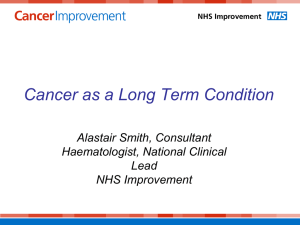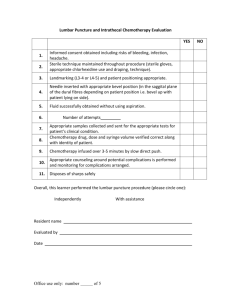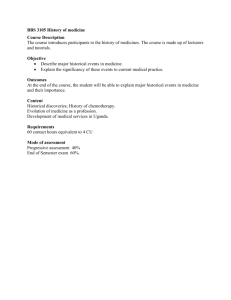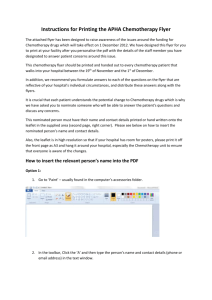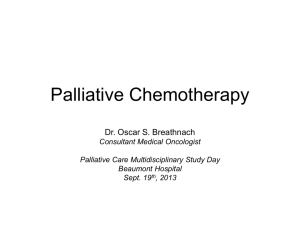Supplementary Information for Patients Receiving OxMdG
advertisement
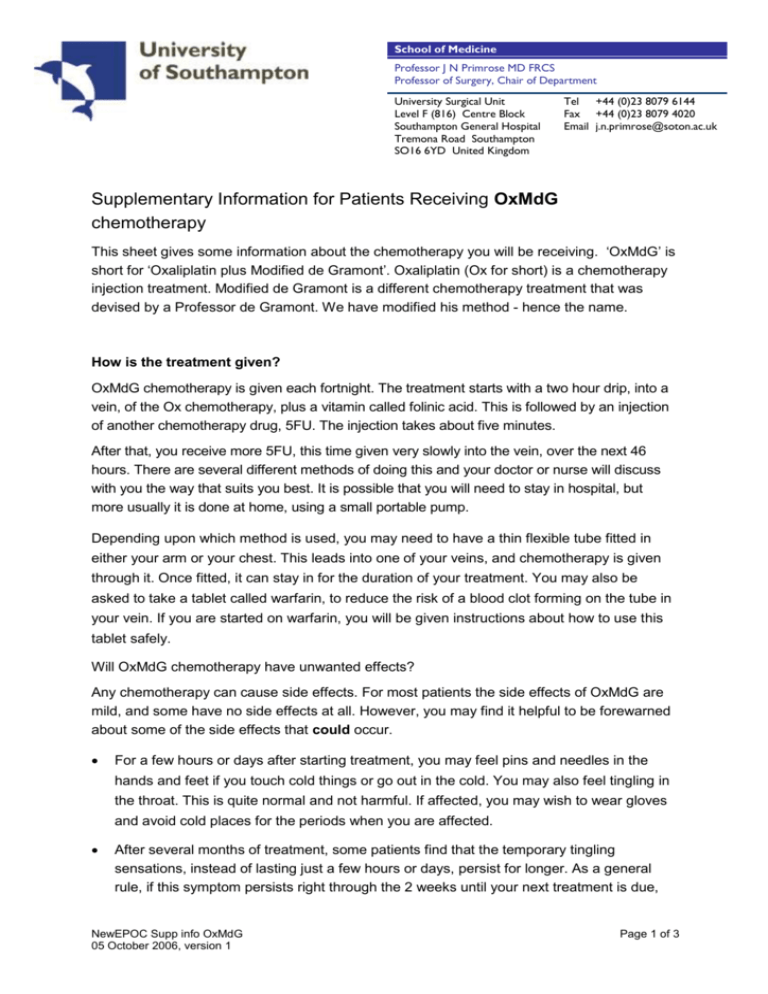
School of Medicine Professor J N Primrose MD FRCS Professor of Surgery, Chair of Department University Surgical Unit Level F (816) Centre Block Southampton General Hospital Tremona Road Southampton SO16 6YD United Kingdom Tel +44 (0)23 8079 6144 Fax +44 (0)23 8079 4020 Email j.n.primrose@soton.ac.uk Supplementary Information for Patients Receiving OxMdG chemotherapy This sheet gives some information about the chemotherapy you will be receiving. ‘OxMdG’ is short for ‘Oxaliplatin plus Modified de Gramont’. Oxaliplatin (Ox for short) is a chemotherapy injection treatment. Modified de Gramont is a different chemotherapy treatment that was devised by a Professor de Gramont. We have modified his method - hence the name. How is the treatment given? OxMdG chemotherapy is given each fortnight. The treatment starts with a two hour drip, into a vein, of the Ox chemotherapy, plus a vitamin called folinic acid. This is followed by an injection of another chemotherapy drug, 5FU. The injection takes about five minutes. After that, you receive more 5FU, this time given very slowly into the vein, over the next 46 hours. There are several different methods of doing this and your doctor or nurse will discuss with you the way that suits you best. It is possible that you will need to stay in hospital, but more usually it is done at home, using a small portable pump. Depending upon which method is used, you may need to have a thin flexible tube fitted in either your arm or your chest. This leads into one of your veins, and chemotherapy is given through it. Once fitted, it can stay in for the duration of your treatment. You may also be asked to take a tablet called warfarin, to reduce the risk of a blood clot forming on the tube in your vein. If you are started on warfarin, you will be given instructions about how to use this tablet safely. Will OxMdG chemotherapy have unwanted effects? Any chemotherapy can cause side effects. For most patients the side effects of OxMdG are mild, and some have no side effects at all. However, you may find it helpful to be forewarned about some of the side effects that could occur. For a few hours or days after starting treatment, you may feel pins and needles in the hands and feet if you touch cold things or go out in the cold. You may also feel tingling in the throat. This is quite normal and not harmful. If affected, you may wish to wear gloves and avoid cold places for the periods when you are affected. After several months of treatment, some patients find that the temporary tingling sensations, instead of lasting just a few hours or days, persist for longer. As a general rule, if this symptom persists right through the 2 weeks until your next treatment is due, NewEPOC Supp info OxMdG 05 October 2006, version 1 Page 1 of 3 and especially you have numbness as well as tingling, it is time to drop one of the drugs – Oxaliplatin – from the chemotherapy. Please ensure you discuss this with your doctors if you are affected. Just occasionally, we meet patients who are unusually sensitive to the effects of 5FU. The reason for this is an unusual metabolism, so 5FU stays in the bloodstream for longer after it has been given. For these patients, side effects such as a sore mouth or diarrhoea occur more quickly and severely than for others. If this happens to you, treatment will be stopped until the problems have resolved. It may then be possible to restart at a lower dose. This does not compromise the effectiveness of treatment. Some people feel discomfort or pain up their arm during the 2 hours that the Ox drip is running. If you are affected please tell the nurse on the chemotherapy unit straight away: this symptom can usually be relieved by placing a warm pad over the arm. Just occasionally, people can become allergic to Ox, though usually only after several treatments. If, while the Ox drip is running, you develop palpitations, an itchy rash, wheezing or a swollen tongue, please tell the nurses immediately. Some patients find they feel a little sick for a few days after starting treatment, but vomiting is unusual. You will be provided with some anti-sickness tablets to take if you start feeling sick. If you vomit more than once in a 24-hour period, please telephone the hospital for advice. OxMdG can cause diarrhoea. You will be given anti-diarrhoea tablets to use if this is mild, but if you have severe diarrhoea (more than 4 watery stools in a day) please telephone the hospital for advice. Some people notice soreness in the mouth or a change in taste for some foods. You will be provided with a mouthwash that may help. If you develop ulcers or pain in the mouth, please telephone the hospital for advice. Some people feel more tired than usual during chemotherapy treatment. There is no easy answer to this, but if you are affected you may find it helps to set aside a rest period in the middle of each day. In the longer term, usually after several months of treatment, some people find that skin on their hands and feet can become red or dry, and some get an itchy nose or sore eyes. All these side-effects can be helped by medication, so if you are affected please talk to your oncology team. If medication has been tried but the side effects persist, it is usually possible to get rid of them by slightly reducing the dose of chemotherapy. This does not compromise the effectiveness of treatment. Hair loss occurs very rarely. Chemotherapy can reduce the number of white cells in your blood. This can lead to increased vulnerability to infections. Your medical team will be monitoring your white cell count each time you come for treatment to make sure it is safe to continue. NewEPOC Supp info OxMdG 05 October 2006, version 1 Page 2 of 3 If you have had a tube fitted for receiving chemotherapy at home, there is a possibility of a problem related to the tube. If you notice any problems such as redness, pain or discharge around the tube, or swelling of one arm, please speak to the doctor or nurse. What about my other medications? Most other medications (though not all) can be taken safely alongside OxMdG treatment. If you are on regular medications, please make sure your specialist knows about them before you start your treatment so that they can be checked. After starting your OxMdG treatment, if any new medication is required it is important that the doctor prescribing it knows you are on OxMdG. It is particularly important to tell your specialist if you are taking a medication called allopurinol. Rare side-effects Very rarely, OxMdG chemotherapy can cause heart palpitations, chest pain (angina), or poor co-ordination. It is most unlikely that you will be affected, but if you suspect you have one of these problems, please discuss it with your oncology doctor or nurse. And finally: If you become suddenly unwell between hospital visits, and especially if you develop a high temperature, shivering attacks or severe diarrhoea, please telephone immediately for advice from your hospital team. You may need to be admitted to the Oncology Unit. Your contact numbers are: ……………………………………………………………………………………………… ……………………………………………………………………………………………… NewEPOC Supp info OxMdG 05 October 2006, version 1 Page 3 of 3
